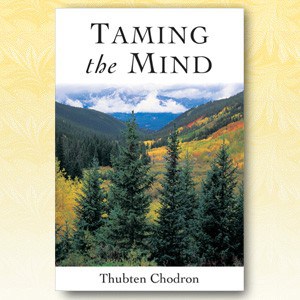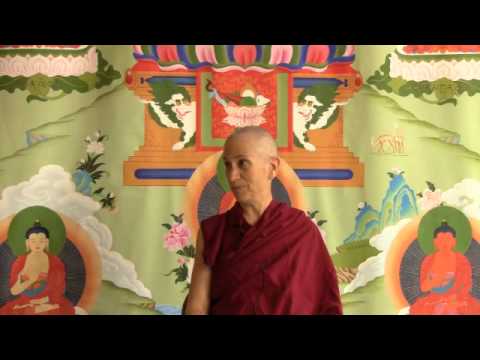Hindrances to concentration: Remorse
Stages of the Path #126: The Fourth Noble Truth
Part of a series of Bodhisattva’s Breakfast Corner talks on the Stages of the Path (or Lamrim) as described in the Guru Puja text by Panchen Lama I Lobsang Chokyi Gyaltsen.
- The definition of “remorse”
- How strong remorse, like guilt, is an unrealistic emotion
- Defining a healthy sense of regret
- Antidotes to remorse
Today we’re going to talk about the interference of remorse, or the hindrance of remorse that disturbs our concentration.
Remorse is the feeling that we haven’t done what we should have done, or we have done what we shouldn’t have done. But one way or the other we feel some kind of remorse, or guilt, or just our actions haven’t been suitable.
This kind of feeling, especially when it gets very intense like guilt, can be a big disturbance, not only to our meditation, but also to our lives. It’s a completely unrealistic emotion, and from the Buddhist perspective is something to be eliminated, because when we feel guilt we’re just all wrapped up in ourselves.
A healthy sense of regret, on the other hand, is useful, because then, with a clear mind, a balanced mind, a wisdom mind, we can assess: “Oh, have I done something that isn’t suitable?” In which case I need to regret it and do the purification, and repair the relationship, and do some kind of corrective measures. But we don’t get all overwhelmed in guilt and negative emotions and self-loathing.
Or we might be able to say, “Oh, I should have done something I didn’t do, because I was too busy spacing out in my own little trip, or sleeping, or being insensitive.” In which case, also, we generate a healthy sense of regret, and try and think, “Well, how can I prevent from acting like that in the future?”
We all do things we shouldn’t have done, and don’t do things we should’ve done. This is natural in life. But the big thing is is if we learn from them. That’s the point, is if we’re able to review, with a balanced mind, and learn from our mistakes, then we go forward and we’re wiser and more compassionate. If we don’t acknowledge our mistakes then we never get past them. And if we get all involved in self-loathing and guilt and shame because of them, then again that becomes a huge hindrance. So we have to learn how to handle these things in a proper, healthy, wisdom way, that has also some compassion for ourselves, and some faith in our own ability and our buddha nature.
[In response to audience] The question is what about when we regret little things, like, “Oh, I should have put olives on the pizza.” That kind of regret, yes, of course, that’s a hindrance in our meditation, isn’t it? You’re meditating and then you go, “Oh, should I have put olives…” Actually, that one comes in the next one, doubt: “Should I put them in…?” This one is regret: “Oh, I should have put them in.” Or, “I did put them in but I shouldn’t have put them in.” That definitely becomes an interference. And then when we regret (not) doing something that’s it’s probably better that we didn’t do, like: “Oh, I should have told that person off.” Or, “I should’ve cheated on my taxes when I had the opportunity.” That’s clearly negative, and that also disturbs our concentration. So yes, it includes all these kinds of useless thoughts
Venerable Thubten Chodron
Venerable Chodron emphasizes the practical application of Buddha’s teachings in our daily lives and is especially skilled at explaining them in ways easily understood and practiced by Westerners. She is well known for her warm, humorous, and lucid teachings. She was ordained as a Buddhist nun in 1977 by Kyabje Ling Rinpoche in Dharamsala, India, and in 1986 she received bhikshuni (full) ordination in Taiwan. Read her full bio.


